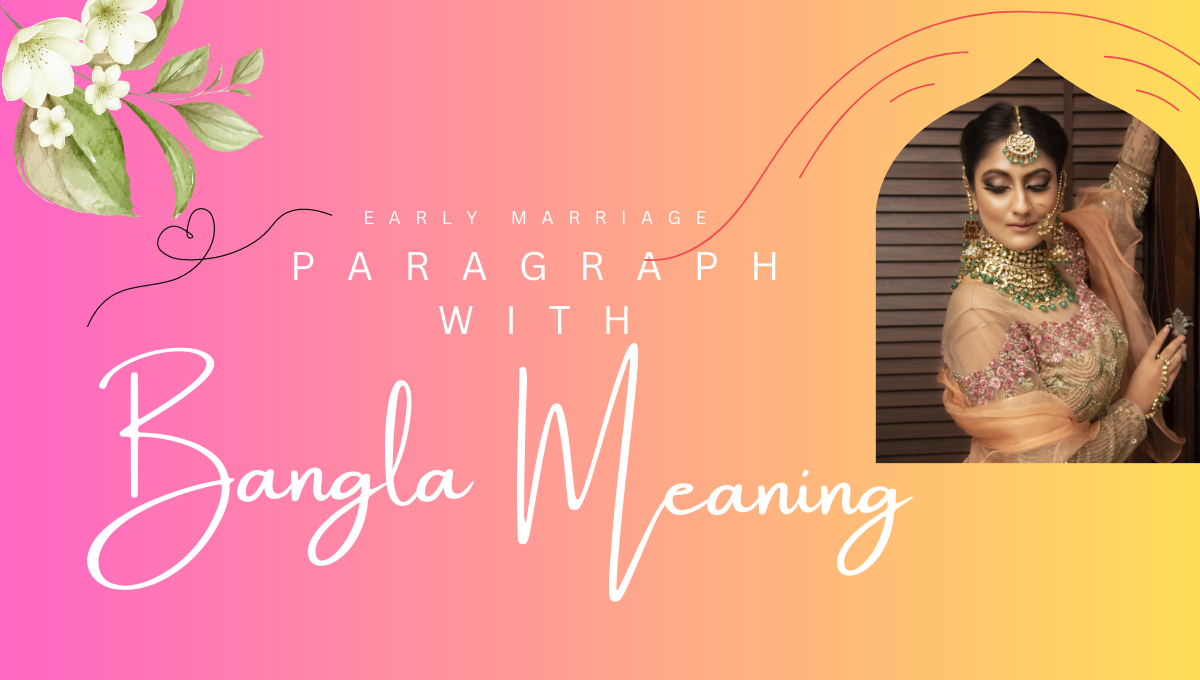Millions of people are impacted by the global problem of early marriage, especially young girls. The purpose of this essay is to educate readers about the practise of early marriage by examining its root causes and the significant effects it has on both individuals and societies. Understanding the intricacies of early marriage will help us work towards a society where everyone has the freedom to make responsible decisions and lead fulfilled lives.
Early marriage, commonly referred to as child marriage or forced marriage, is the union of two people before they reach the legal marriage age of 18, which is typically 18 years old. Girls are primarily affected by this practise, which frequently robs them of their youth, education, and possibilities for personal growth.
Early marriage is still very common due to cultural and traditional standards. In some cultures, where girls are viewed as financial burdens or objects of control, the practise is strongly ingrained in traditional ideas. Early marriage is still common because of things like maintaining family honour, upholding social order, and protecting imagined purity.
Early marriage is mostly influenced by economic and social variables. Poor families could see marriage as a way to reduce their financial burdens and ensure the prospects of their daughters. A cycle of poverty is perpetuated and prospects for girls are constrained by the practise, which is occasionally seen as a method to save money on household expenditures or obtain dowry payments.
Another important reason in early marriage is the lack of access to high-quality education, especially for girls. Girls who are denied an education are more likely to be forced into child marriage because they lack the information and skills to fight for their rights. Girls are empowered by education because it gives them a voice, the capacity for critical thought, and the chance to follow their aspirations.
Females who marry early face a number of health hazards. Young brides frequently experience difficulties giving birth since their bodies are not fully matured. They are more likely to experience problems with their reproductive system, baby mortality, and mother mortality. Additionally, early marriage can aid in the spread of HIV/AIDS and other STDs.
Girls’ education is disrupted by early marriage, depriving them of the opportunity to learn the knowledge and skills necessary for their own development and independence. Early marriage forces many girls to leave school early, which feeds the cycle of poverty and unemployment. The individual is impacted by this lack of education, but communities and countries are also prevented from making social and economic growth.
Young girls’ psychological and emotional health suffers as a result of early marriage because they are thrown into adult duties before they are emotionally ready. The sudden change from childhood to married life may cause them to feel extremely stressed, anxious, and depressed. Their personal development and general happiness may be hampered by the loss of freedom, constrained decision-making, and possibility of abuse or exploitation.
Legal changes have been made in numerous nations to address the issue of young marriage. The practise must be stopped through regulations that specify a minimum age for marriage and impose penalties on those who break them. However, many localities continue to struggle with the efficient application and enforcement of these regulations.
Combating this practise requires promoting education and increasing public awareness of the drawbacks of early marriage. Giving both boys and girls access to high-quality education and comprehensive sexuality education empowers people to make educated decisions and subverts long-standing social conventions that support early marriage.
Preventing early marriage requires empowering women and girls. This entails giving girls the chance to improve their skills, receive vocational training, and gain economic empowerment so they may take charge of their own life and become financially independent. Additionally, programmes that encourage girls’ education, combat negative gender norms, and advance gender equality can foster an environment that discourages early marriage.
Millions of girls lose their childhood, education, and future opportunities due to early marriage. It is a problem with a strong cultural, economic, and social foundation. Understanding early marriage’s origins and effects can help us develop comprehensive solutions that put an emphasis on legal changes, education reform, and the empowerment of women and girls. Together, we can bring about a better future where everyone has the freedom to decide what to do with their own life.
বাংলা অনুবাদ
লক্ষ লক্ষ মানুষ বাল্যবিবাহের বৈশ্বিক সমস্যা দ্বারা প্রভাবিত হয়, বিশেষ করে অল্পবয়সী মেয়েরা। এই প্রবন্ধের উদ্দেশ্য হল বাল্যবিবাহের অভ্যাস সম্পর্কে পাঠকদের শিক্ষিত করা এবং এর মূল কারণগুলি এবং ব্যক্তি ও সমাজ উভয়ের উপর এর উল্লেখযোগ্য প্রভাবগুলি পরীক্ষা করে। বাল্যবিবাহের জটিলতাগুলি বোঝা আমাদের এমন একটি সমাজের দিকে কাজ করতে সাহায্য করবে যেখানে প্রত্যেকেরই দায়িত্বশীল সিদ্ধান্ত নেওয়ার এবং পরিপূর্ণ জীবনযাপন করার স্বাধীনতা রয়েছে।
বাল্যবিবাহ, সাধারণত বাল্যবিবাহ বা জোরপূর্বক বিবাহ হিসাবে উল্লেখ করা হয়, আইনগত বিবাহের বয়স 18 বছর, যা সাধারণত 18 বছর বয়সে পৌঁছানোর আগে দুজনের মিলন। মেয়েরা প্রাথমিকভাবে এই অনুশীলনের দ্বারা প্রভাবিত হয়, যা প্রায়শই তাদের যৌবন, শিক্ষা এবং ব্যক্তিগত বৃদ্ধির সম্ভাবনাগুলি কেড়ে নেয়।
সাংস্কৃতিক এবং ঐতিহ্যগত মানদণ্ডের কারণে বাল্যবিবাহ এখনও খুব সাধারণ। কিছু সংস্কৃতিতে, যেখানে মেয়েদের আর্থিক বোঝা বা নিয়ন্ত্রণের বস্তু হিসাবে দেখা হয়, অনুশীলনটি প্রথাগত ধারণার সাথে দৃঢ়ভাবে জড়িত। পারিবারিক সম্মান বজায় রাখা, সামাজিক শৃঙ্খলা বজায় রাখা এবং কাল্পনিক বিশুদ্ধতা রক্ষা করার মতো বিষয়গুলির কারণে বাল্যবিবাহ এখনও সাধারণ।
বাল্যবিবাহ মূলত অর্থনৈতিক ও সামাজিক পরিবর্তন দ্বারা প্রভাবিত হয়। দরিদ্র পরিবারগুলি বিবাহকে তাদের আর্থিক বোঝা কমানোর এবং তাদের মেয়েদের সম্ভাবনা নিশ্চিত করার উপায় হিসাবে দেখতে পারে। দারিদ্র্যের একটি চক্র স্থায়ী হয় এবং মেয়েদের জন্য সম্ভাবনাগুলি অনুশীলনের দ্বারা সীমাবদ্ধ থাকে, যা মাঝে মাঝে পারিবারিক খরচে অর্থ সঞ্চয় বা যৌতুক প্রদানের একটি পদ্ধতি হিসাবে দেখা হয়।
বাল্যবিবাহের আরেকটি গুরুত্বপূর্ণ কারণ হল উচ্চ মানের শিক্ষার সুযোগ না থাকা, বিশেষ করে মেয়েদের। যে মেয়েরা শিক্ষা থেকে বঞ্চিত হয় তাদের বাল্যবিবাহে বাধ্য হওয়ার সম্ভাবনা বেশি কারণ তাদের অধিকারের জন্য লড়াই করার তথ্য ও দক্ষতা নেই। মেয়েরা শিক্ষার দ্বারা ক্ষমতাপ্রাপ্ত হয় কারণ এটি তাদের একটি কণ্ঠস্বর, সমালোচনামূলক চিন্তা করার ক্ষমতা এবং তাদের আকাঙ্খা অনুসরণ করার সুযোগ দেয়।
যেসব মহিলারা তাড়াতাড়ি বিয়ে করেন তারা বেশ কিছু স্বাস্থ্যগত বিপদের সম্মুখীন হন। অল্পবয়সী নববধূরা প্রায়শই সন্তান জন্মদানে অসুবিধার সম্মুখীন হয় কারণ তাদের শরীর সম্পূর্ণ পরিপক্ক হয় না। তারা তাদের প্রজনন ব্যবস্থা, শিশুর মৃত্যু এবং মাতৃমৃত্যুর সমস্যা অনুভব করার সম্ভাবনা বেশি। উপরন্তু, বাল্যবিবাহ এইচআইভি/এইডস এবং অন্যান্য STD-এর বিস্তারে সাহায্য করতে পারে।
বাল্যবিবাহের কারণে মেয়েদের শিক্ষা ব্যাহত হয়, তাদের নিজস্ব বিকাশ ও স্বাধীনতার জন্য প্রয়োজনীয় জ্ঞান ও দক্ষতা শেখার সুযোগ থেকে বঞ্চিত হয়। বাল্যবিবাহ অনেক মেয়েকে তাড়াতাড়ি স্কুল ত্যাগ করতে বাধ্য করে, যা দারিদ্র্য এবং বেকারত্বের চক্রকে খাওয়ায়। শিক্ষার এই অভাব দ্বারা ব্যক্তি প্রভাবিত হয়, কিন্তু সম্প্রদায় এবং দেশগুলিও সামাজিক ও অর্থনৈতিক প্রবৃদ্ধি করতে বাধাগ্রস্ত হয়।
অল্পবয়সী মেয়েদের বাল্যবিবাহের ফলে মানসিক ও মানসিক স্বাস্থ্য ক্ষতিগ্রস্ত হয় কারণ তারা মানসিকভাবে প্রস্তুত হওয়ার আগেই প্রাপ্তবয়স্কদের দায়িত্বে নিক্ষিপ্ত হয়। শৈশব থেকে বিবাহিত জীবনে আকস্মিক পরিবর্তনের ফলে তারা অত্যন্ত চাপ, উদ্বিগ্ন এবং বিষণ্ণ বোধ করতে পারে। তাদের ব্যক্তিগত বিকাশ এবং সাধারণ সুখ স্বাধীনতা হারানো, সীমাবদ্ধ সিদ্ধান্ত গ্রহণ এবং অপব্যবহার বা শোষণের সম্ভাবনা দ্বারা বাধাগ্রস্ত হতে পারে।
অল্পবয়সী বিবাহের সমস্যা সমাধানের জন্য অনেক দেশে আইনি পরিবর্তন করা হয়েছে। বিবাহের জন্য একটি ন্যূনতম বয়স নির্দিষ্ট করে এমন নিয়মের মাধ্যমে প্রথাটি বন্ধ করতে হবে এবং যারা এগুলি ভঙ্গ করে তাদের উপর জরিমানা আরোপ করতে হবে। যাইহোক, অনেক এলাকা এই নিয়মগুলির দক্ষ প্রয়োগ এবং প্রয়োগের সাথে সংগ্রাম চালিয়ে যাচ্ছে।
এই অভ্যাসের বিরুদ্ধে লড়াইয়ের জন্য প্রয়োজন শিক্ষার প্রচার এবং বাল্যবিবাহের ত্রুটি সম্পর্কে জনসচেতনতা বৃদ্ধি করা। ছেলে ও মেয়ে উভয়কেই উচ্চ-মানের শিক্ষা এবং ব্যাপক যৌনতা শিক্ষায় প্রবেশাধিকার প্রদান করা মানুষকে শিক্ষিত সিদ্ধান্ত নেওয়ার ক্ষমতা দেয় এবং বাল্যবিবাহকে সমর্থন করে এমন দীর্ঘস্থায়ী সামাজিক প্রথাগুলিকে নষ্ট করে।
বাল্যবিবাহ রোধে নারী ও মেয়েদের ক্ষমতায়ন প্রয়োজন। এটি মেয়েদের তাদের দক্ষতা উন্নত করার, বৃত্তিমূলক প্রশিক্ষণ গ্রহণ এবং অর্থনৈতিক ক্ষমতায়ন লাভের সুযোগ দেয় যাতে তারা তাদের নিজের জীবনের দায়িত্ব নিতে পারে এবং আর্থিকভাবে স্বাধীন হতে পারে। উপরন্তু, যে প্রোগ্রামগুলি মেয়েদের শিক্ষাকে উৎসাহিত করে, নেতিবাচক লিঙ্গ নিয়মের বিরুদ্ধে লড়াই করে এবং লিঙ্গ সমতার অগ্রগতি করে এমন একটি পরিবেশ তৈরি করতে পারে যা বাল্যবিবাহকে নিরুৎসাহিত করে।
বাল্যবিবাহের কারণে লক্ষ লক্ষ মেয়ে তাদের শৈশব, শিক্ষা এবং ভবিষ্যতের সুযোগ হারায়। এটি একটি শক্তিশালী সাংস্কৃতিক, অর্থনৈতিক এবং সামাজিক ভিত্তির সাথে একটি সমস্যা। বাল্যবিবাহের উত্স এবং প্রভাবগুলি বোঝা আমাদেরকে এমন ব্যাপক সমাধান তৈরি করতে সাহায্য করতে পারে যা আইনি পরিবর্তন, শিক্ষা সংস্কার এবং নারী ও মেয়েদের ক্ষমতায়নের উপর জোর দেয়। একসাথে, আমরা একটি ভাল ভবিষ্যত নিয়ে আসতে পারি যেখানে প্রত্যেকের নিজের জীবন নিয়ে কী করতে হবে তা সিদ্ধান্ত নেওয়ার স্বাধীনতা রয়েছে।
বাংলা অনুবাদ
- early marriage – আগের বিবাহ
- child marriage – শিশু বিবাহ
- forced marriage – বাধ্যতামূলক বিবাহ
- legal marriage age – আইনগত বিবাহ বয়স
- cultural and traditional standards – সাংস্কৃতিক এবং ঐতিহ্যগত মান
- financial burdens – আর্থিক বোধগম্যতা
- objects of control – নিয়ন্ত্রণের বস্তু
- social order – সামাজিক ব্যবস্থা
- economic variables – অর্থনৈতিক চলচ্চিত্র
- cycle of poverty – দারিদ্র্যের চক্র
- lack of access to education – শিক্ষার অভাব
- reproductive system – প্রজনন সিস্টেম
- HIV/AIDS – এইচআইভি/এইডস
- sexually transmitted diseases – যৌনসঙ্গতিপ্রবৃত্তির রোগ
- psychological and emotional health – মনস্তাত্বিক এবং আচরণবিজ্ঞানিক স্বাস্থ্য
- legal changes – আইনগত পরিবর্তন
- public awareness – জনসচেতনতা
- gender equality – লিঙ্গ সমানতা
- vocational training – পেশাগত প্রশিক্ষণ
- empowerment of women and girls – নারী ও মেয়েদের শক্তিপ্রাপ্তি.

